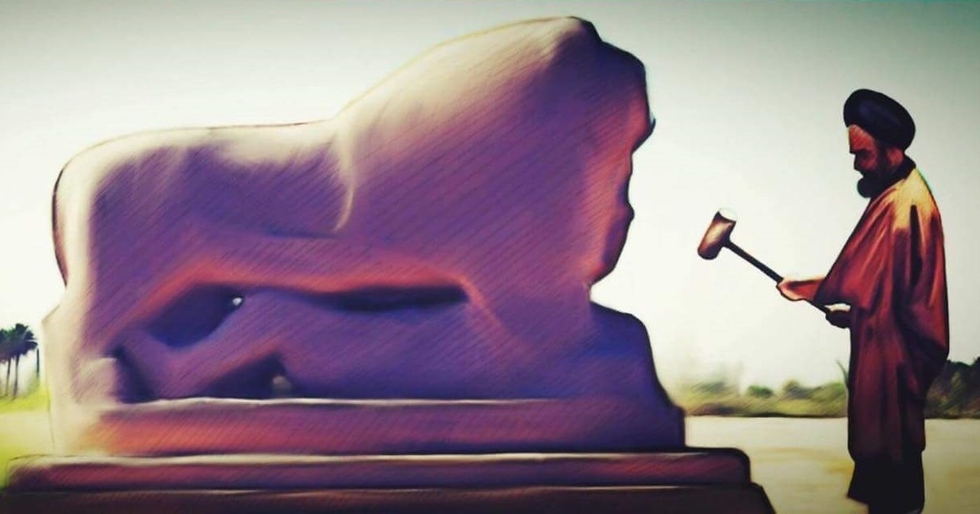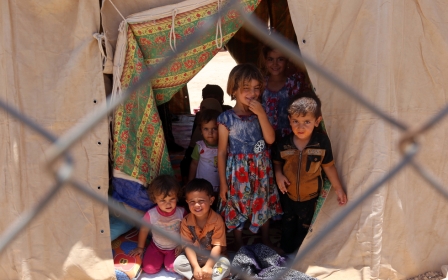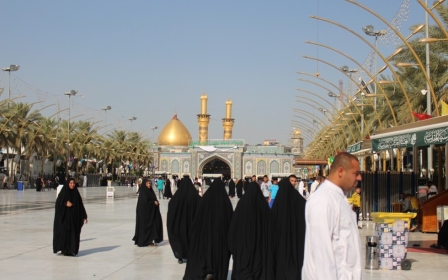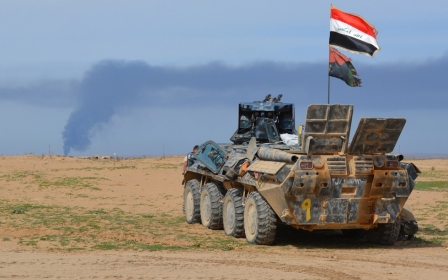Iraqi social media erupts as clerics propose re-naming ancient city of Babylon

A religious organisation’s attempt to rename the historical city of Babel (Babylon) in Iraq backfired spectacularly on Monday, sparking a wave of anger across Iraqi social media.
The preparatory committee of the Imam Hussein Holy Shrine first posted about its hopes to change the name to Imam Hassan City on Sunday, suggesting it would be a good way to honour the "generosity" of local residents ahead of a religious festival.
As the hashtag #My_Name_Is_Babel took Iraqi social media by storm, the Imam Hassan organisation quickly denied it had anything to do with the initiative, but the damage was already done with Iraqis continuing to slam the proposal as an attempt to rob them of their national heritage.
Translation: #My_Name_Is_Babel - An Iraqi hashtag has started .. to prevent the name change of the city of Babel to the religious name “Imam Hassan City,” as it as a historical city
A statement released by the Imam Hassan organisation on Sunday said: “The festival will begin its activities on Monday in the middle of the city of Babel for three consecutive days in honour of the birth of Imam Hassan with international, official and local participation.”
“The choice of the name Imam Hassan for the city of Babel came after the generosity the people of this city show[ed] when receiving millions of people flocking from different parts of the world to visit Imam Hussein, especially considering that Babel is the principal gateway in the direction of [the holy Shia city of] Karbala,” the statement added.
Ali Kazem Soltan, a member of the Holy Shrine’s preparatory committee, said that the demand to rename Babel province originally came from a proposal by the former Shia cleric Sayyed Muhsin al-Hakim, according to al-Arabiya news channel.
Hakim, who died in 1970 and was a distinguished scholar in the Shia tradition during his era, wanted each of Iraq’s provinces to be named after one of the 12 main Shia Imams, who all descended from Imam Ali.
However, social media quickly erupted in protest.
One of the most shared pictures on social media saw a Shia cleric with a sledgehammer standing opposite the Lion of Babylon statue – considered to be Iraq’s national symbol.
The online Arabi 21 news website quoted activists involved in the campaign as saying they were “standing against those who were attempting to deface Iraqi civilisation and deepen sectarian conflicts and disputes”.
Babel was one of the most famous cities of ancient Mesopotamian civilisation, located in the fertile plain between the Tigris and the Euphrates rivers. The 7,000-year-old site is an integral part of Iraqi national identity. It is best known for the Old Testament story in which its residents seek to build a tower all the way to the heavens, a move that angers God who, in punishment, forces humans to start speaking different languages so that they can no longer understand one another.
Today Babel is located in a largely Shia province that bears the same name and rests south of Baghdad. The Imam Hussein Holy Shrine is located in Karbala, a Shia heartland, just to the west.
But the outrage at the proposal cut across sectarian lines and touched a popular nerve regarding Iraq’s increasingly fractured national identity, as well as highlighting the resentment towards Iranian influence in the country which has increased since the 2003 US-led invasion.
Outrage
Iraqi intellectuals and citizens alike took to social media with an avalanche of angry responses over the proposal.
Translation: #My_Name_Is_Babel - Many have tried to destroy me over the ages but I remained high like palm trees #Iraq... Salute to all Iraqis who stood in one rank against changing the name of Babel
Ghaith al-Tamimi, an Iraqi writer and researcher in Islamic thought, said on Facebook: “It is not enough for them to steal our present and our future in the name of religion. These people seek to steal our past and the remnants of our glory in its name as well!!!”
“The Lord of the worlds in his Book did not change Babel’s name!! And now come the ignorant, and those of irregular positions, who want to change its name,” Iraqi journalist Amir al-Kabeesy also posted on Facebook.
Some activists emphasised that the site is mentioned by its historic name, Babel, in the Holy Quran.
“It was not Solomon who disbelieved, but the devils disbelieved, teaching people magic and that which was revealed to the two angels at Babylon, Harut and Marut,” posted activist Shojaa’ al-Khofajy, quoting from the Quran. “So are you also going to change the Quran?” he asked rhetorically.
Journalist Mostafa Nasser said: “This is the pit that we have reached, a city whose age is 7,000 years is having its name changed from Babel to Hassan City. More than 50 Western, Arab and Islamic countries give the name Babel to their junctions, cities and research centres and we are attempting to muffle our own civilisation. Instead of thinking of the name, try organising a festival to build schools and hospitals."
Ordinary Iraqi citizens also expressed their frustration.
“Daesh destroyed the winged bull,” Facebook user Sara Salo said, referring to the havoc Islamic State group has wrecked on archaeological sites in the country. “And today the bulls are pouncing on what remains of Iraq’s history.”
Nour Sabah, an Iraqi resident, meanwhile tweeted that: “Our rulers should change the reality of our province. They should think of the people’s bitter reality before thinking about the city’s name.”
Politicians likewise waded into the debate. Hassan Kamounah, a member of Babel’s provincial council, said a change of name may “take another route” and lead to unexpected consequences.
Speaking to TV channel al-Sumaria News, he tried to reject a name change by using religious flattery, saying that Imam Hassan, “cannot be compared to a city, rather his name envelops the whole world because he is the Imam of humanity in its entirety”.
Translation: #Babel_Is_My_Civilization - Babel is a name that cannot be switched, Babel’s name will be switched and all of this under the watch of the Imam Hussein’s Holy Shrine and we do not know why this name?
Climbdown
With social media set ablaze by the proposed name change, the Imam Hussein Holy Shrine organisation was forced into a humiliating climbdown.
“The festival aims first and foremost to revive the memory of the birth of Imam Hassan,” said a hastily posted "clarifying statement" on the Holy Shrine’s website, complete with an image with only the words “important and urgent” written in bold white font on a red background.
“The Holy Shrine has made no attempts to change the official name of the city but rather has attempted to highlight the generosity of the city’s people for welcoming visitors," Ali Kazem Soltan, the member of the Holy Shrine’s preparatory committee, was quoted by the statement as saying.
“What is stated in the news is as far away as possible from the path of the Imam Hussein Holy Shrine,” Arabi 21 reported the Holy Shrine as saying following the fallout. “The Holy Shrine will participate in the festivities regarding the birth of Imam Hassan, which will take place in Babel, nothing else.”
The Holy Shrine’s official website has now erased the original statement from its page, but Iraqi activists saved the post and have continued to share it online.
Translation: Screenshots of original statement on Imam Hussein’s Holy Shrine’s website - Text: To those who doubt the news about changing the name of Babel province, the Holy Shrine’s page before and after the removal (of the statement)
Middle East Eye propose une couverture et une analyse indépendantes et incomparables du Moyen-Orient, de l’Afrique du Nord et d’autres régions du monde. Pour en savoir plus sur la reprise de ce contenu et les frais qui s’appliquent, veuillez remplir ce formulaire [en anglais]. Pour en savoir plus sur MEE, cliquez ici [en anglais].




